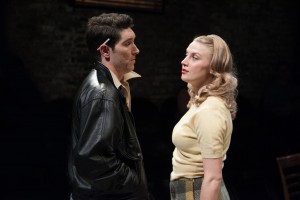AN OFFER HE CAN’T REFUSE
It’s easy to dislike this alleged 511-year-old comedy. All’s Well That Ends Well (originally Love’s Labors Won) is the wrong title: It should be “The End Justifies The Means.” The end is for the sadly smitten Isabella to successfully fornicate with Bertram, her attractive and worthless spouse. The means is for poor but plucky Isabella to stalk this spoiled snob, impersonate another woman, have sex and acquire the ring (and the pregnancy) without which Bertram–a Count of Roussillon–will not wed her. Improbably, Bertram, who had haughtily refused to consummate his forced marriage, is won over by Helen’s sexual shenanigans. Sure, Bertram gets finagled into marriage, commanded by his king to marry Helena out of gratitude for her saving his life. But Bertram remains a rancid egomaniac whose real passion is war and whores.
Helena’s end justifies her means, including a ludicrous rumor of her death. But the real lesson is that, whatever the ending, neither mate deserves the other. Helena is as trapped by her infatuation as Bertram by his blindness to her worth. Substituting for your own rival is hardly a wife’s duty to a faithless husband.
To make this fractured fairy tale work each extreme–Bertram’s fear of being trapped and Helena’s fear of losing the love of her life–must be embraced with deadly seriousness. Too long at nearly three hours (this script implores to be cut), Drew Martin’s staging fatally takes its tone from the paltry comic relief provided by the braggart churl Paroles and the unfunny clown Lavatch. Ranging from Chicago to New York to Florence, Shakespeare’s dark comedy is here set in 1959, which inconveniently recalls West Side Story. The characters are Mafia stereotypes–Moustache Petes, goombah goofballs, wise guys, women who are either madonnas or whores, and a godfather passing as a king.
It’s a difficult graft, making this “mob connection” take on a play that’s much grayer than it sounds. In any case it can’t conceal the cruelty of the plot’s monumental mismatch that’s supposed to end with love as well as marriage. This “Italian job” only reinforces the Alpha-male, testosterone-fueled swaggering and posturing of the loud-mouth Lotharios.
Melanie Derleth’s ardent Helena is a puzzle. Unlike some Helenas, she never resorts to an overly emphatic delivery and semaphore gestures. But her eagerness to win the loathsome Bertram comes out of nowhere and goes there. Luke Daigle’s feckless Bertram fares better: This Bertram really seems preoccupied with war over love, if only because he won’t be forced into marriage. He can all too easily separate sex from love–except in marriage. Since his prospective mate Helena can’t inspire the former, she doesn’t earn the latter.
Flaunting his Tommy gun and snarling like Edward G. Robinson on a tear, Jeremy Trager, intentionally or not, leaves out the lovable side of roguish Paroles: Here he’s just a panderer and traitor to the troops, a foil for Sandy Elias’ gruff Lafew to too easily despise. Rich Logan’s King is more threatening than regal. Susie Griffith as Bertram’s feckless mother can only get caught in the crossfire. Recalling Rocky Balboa’s stentorian Adrian as Diana, Heather Chrisler gives the men the kind of payback they deserve–but it should come from Helena, not her. She could have been a contender.
All’s Well That Ends Well
Stage Left Theatre
Theater Wit, 1229 W Belmont
ends on May 24, 2015
for tickets, call 773-975-8150
or visit www.theaterwit.org
for info on this and other Chicago Theater,
visit www.TheatreinChicago.com








{ 2 comments… read them below or add one }
Isabella? No one in this play is named Isabella. Also the Madonna or whore bit is a problem. I saw the show and no woman struck me as a whore. Not a single woman. Can you elaborate which female character we saw not having sex (except for the consummating wife) was a whore?
I disagree with other of your interpretations as well, but these are simply factually incorrect.
Isabella is Helena, of course.
Sorry for that misstatement. I meant Helena.
As for the whore characterization, the Florentine setting includes a bordello. So why mince words? Bertram is betraying Isabella with a goodtime girl named Diana (I got that one right). He doesn’t deserve Helena nor Shakespeare this misguided Puso-fication.